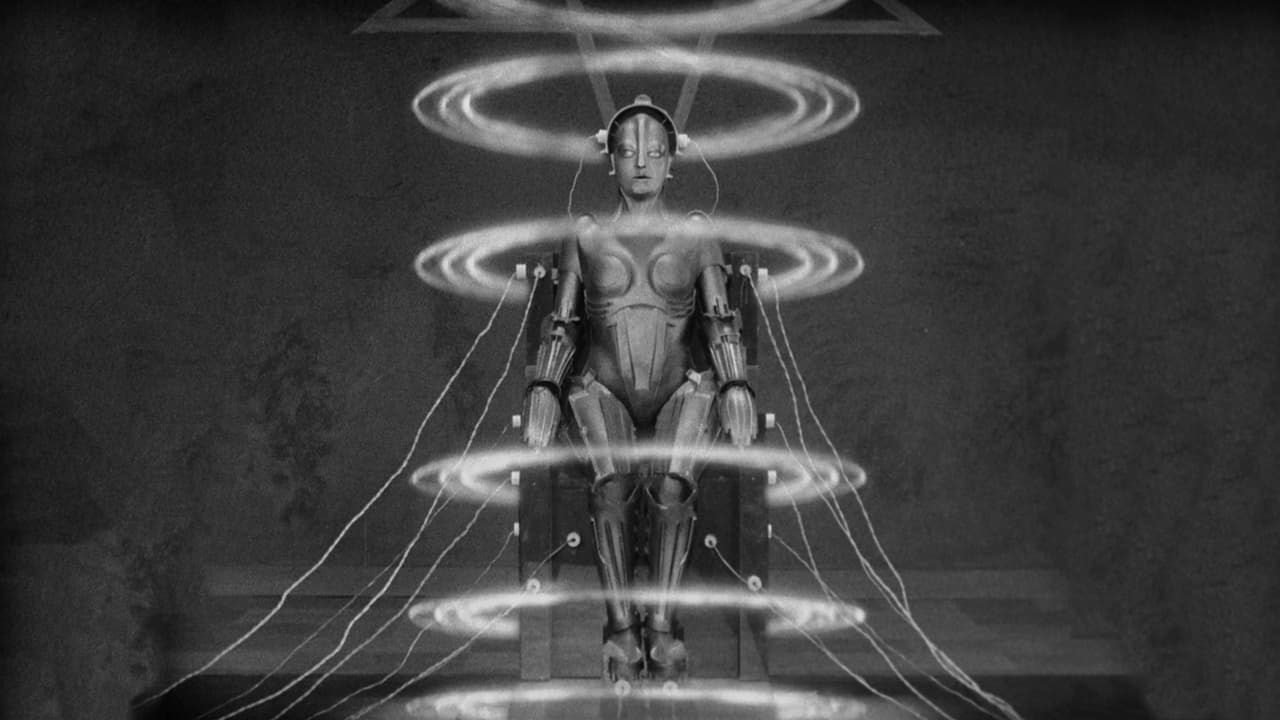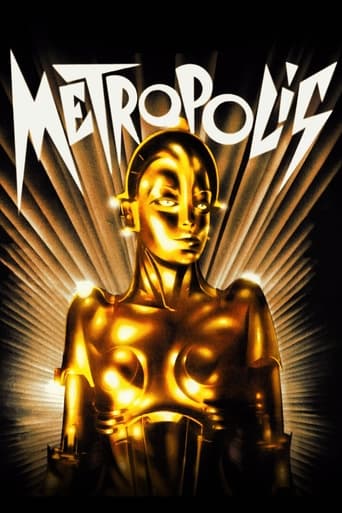Incannerax
What a waste of my time!!!
Tedfoldol
everything you have heard about this movie is true.
Brendon Jones
It’s fine. It's literally the definition of a fine movie. You’ve seen it before, you know every beat and outcome before the characters even do. Only question is how much escapism you’re looking for.
Lidia Draper
Great example of an old-fashioned, pure-at-heart escapist event movie that doesn't pretend to be anything that it's not and has boat loads of fun being its own ludicrous self.
s-kuckovsky
I think this is one of the most amazing movies from silent era not only in terms of "visual effects". Story is interesting and entertaining to watch.
Mork_the_Borg
Just upgraded my rating for this movie from a 9/10 to a 10/10. Why? Because the more I think about the total and absolute rubbish released today (2018), the more I start to appreciate the absolute beauty of this master-piece, which in SF terms still happily shares a 1st place with Kubrick's Space Odyssey. This movie - for its time - and to a large extent still today - shows film as an art-form in all its glory, and the power of a great story. Simply cannot believe that people would rate a rubbish series like Supernatural a 10/10, but can't see a real cinematographic jewel not even when it's tattooed on their face! Ah well, let's see what this year has to offer. It's movie trailer-time for this guy!
cinemajesty
Film Review: "Metropolis" (1927)Three years of intense production work between 1924 and 1927 in the Weimar Republic (German State from 1919-1933) concludes with the last epic motion picture of the silent era in cinema with "Metropolis" releasing on January 10th 1927 in Berlin and March 6th 1927 in New York City.Director Fritz Lang (1890-1976) and Writer Thea von Harbou (1888-1954) reflect on lavishly lived times of the in-between years of Two World Wars and cinema itself as the evolution of all art forms, which came before, locking in the prototype of today's so-called "Event Movie Cinema".A universal storyline on morals of human society fills the silver screen to the opening remark as punchline on necessities in order to create: "Between the head and the hands must be the heart." A remark, defying any political regime based one-sided horror, terror and violence, seeks to balance society between the light and the dark.The picture centers five decisive static, high-design, volume-speaking shots of a CLOCK, the MACHINE, a CITY, a SIGNAL and the PEOPLE. The cinematography establishes scope with depth of field of layered matte paintings, which then in 1937 finds its evolutionary step in animation with "Snow White and The Seven Dwarfs" produced and directed by uncredited Walt Disney (1901-1966).A glance between a rebellion-leading woman, portrayed by actress Brigitte Helm (1906-1996) in double role as the character of Maria and The Machine Man; entrepreneur Joh Fredersen's son by the name Freder, given face by actor Gustav Fröhlich (1902-1987), commences the eager wish for change in society toward a balanced work-leisure-relationship.The original full-orchestra musical score by composer Gottfried Huppertz (1887-1937) underlines each scene with aural beats of soundmaps, enhancing transcendence of the character's emotions to the audience.The Son, driven by force and passion to learn from the worker's community, infiltrates his father's factory with a suspense-building identity swap with one of the workers, while the Father puts his son under surveillance by a mysterious investigator dressed in black with hat.At running time 0h 38mins 15sec, the story thickens with Industrial frontrunner Fredersen, performed by actor Alfred Abel (1879-1937), encounter with nemesis C.A. Rotwang, the inventor, wearing a black glove, covering his right hand, which is believed to be a fully mechanized metal hand, triggering scenes for motion picture classics as "Star Wars: Episode V – The Empire Strikes Back" (1980) and the fundamental basis for the cybernetic character in "The Terminator" (1984) directed by James Cameron.The conflicting content raises stakes with revealing that characters of Rotwang and Fredersen loved the same woman, who died in giving birth to son Freder. The inventor obsessed by the idea of defying death and creating a Machine Man, presents the manager with hard evidence that an underground rebellion has been in progression, triggered by rebel leader Maria.Fredersen, in danger to lose his power in the city, demands Rotwang to fulfil the creation of a Machine Man in giving it the face of rebel leader Maria. Little does he know that his order sets society threatening actions in motion, while his son Freder kisses Maria, who eventually gets abducted by Rotwang in a mystical, horror-genre-embracing mis-en-scène within "Metropolis" underground catacombs in atmospheric production design of earthy dust, human skeleton parts put into place for a flash-lighting pursuit in the dark, before the FIRST PART of the film ends with a high pitch cliffhanger of Rotwang cornering Maria.The ENTRE'ACTE of "Metropolis" follows a 30 minutes montage sequence, where Maria, in the clutches of Rotwang, gets strapped in a glass tube for transformation, reminiscing the character of Leeloo in "The Fifth Element" directed by Luc Besson with stripes covering certain body parts of her naked body; the metallic-faced Machine Woman gets morphed into breathing organism of flesh and blood with a science fiction visual of super-imposition in order to mimic Maria in society to destroy the rebel's reputation.The experimental stage of the picture leads director Fritz Lang to emerge one of two appearing immersive camera movements with a single shot point-of-view (POV) of Freder's hand reaching out for evidence at running time marker 1h 22mins 15 sec, searching for further leads to Maria's whereabouts. Art Décor production design in a timeless reception striking into the spectre's eye still prevails to amaze. Classic shot continuity gets abandoned completely with In-Shot set interior transformation, recalled by director Martin Scorsese in a computer-generated digital green-screen set-up of the film "Shutter Island", where the character of Teddy Daniels, portrayed by Leonardo DiCaprio embracing the reminiscence of his wife Dolores, performed by Michelle Williams, in a psychedelic memory shot.Actress Brigitte Helm rampages in the night club "Yoshiwara" at a downtown Metropolitan location, running the high society men, wearing in tuxedos into hostility and duels to death, when the revolution begins at time code 1h 42mins 00sec with an uprising, heart-machine destructing live-action masses of communal-bound workers. The dynamics leave today's audiences guessing what may have hold the full 210 minutes world-premiering final cut from 1927 in stakes, when most character-endangering fight scenes as Fredersen versus Rotwang in an high-tech laboratory have vanished from the face of the Earth, considered among forever lost scenes of motion picture history.The showdown of "Metropolis" on rooftops of the highest, Notre Dame reminding, Gothic cathedral needs to be witness to believe how close the scenario delivers striking character action with contemporary cinema. Parallels to "Batman" (1989) directed by Tim Burton and "The Crow" (1994) directed by Alex Proyas are undeniable evident, when a full circle conclusion puts the spectator into awe with an concluding premise Three-Shot of balancing the HEAD, the HANDS and the HEART for future generations to come.© 2017 Felix Alexander Dausend (edited version) (Cinemajesty Entertainments LLC)
CinemaClown
An ambitious, audacious & astounding example of science-fiction and one of the most influential & essential works of the silent era, Metropolis is widely recognised as a masterpiece of imagination, creativity & filmmaking art today and its vision of the future & the depicted relation between man & machine was far ahead of its time, and although its groundbreaking technical craftsmanship is still capable of dazzling everyone, its narrative isn't as compelling.A silent feature film with a runtime exceeding 150 minutes was never going to be a comfortable sit but given the film's reputation, it was a must-watch. And Metropolis does manage to transfix in its earlier moments with its dystopian setting & unsettling illustration of what a human is reduced to. The countless innovations in cinematography & practical effects do make you wonder how any of it was accomplished back then but after a while, its runtime is severely felt.Set in a dystopian future, the story of Metropolis takes place in the titular city which is home to an utopian society where a sharp divide lies between the working class & city planners, as the former works incessantly to keep the machines running to power the city while the latter enjoys a carefree life. The plot follows the son of the city's mastermind who falls in love with a working class prophet who has predicted the coming of a mediator who will solve all their differences.Co-written & directed by Fritz Lang (best known for M), Metropolis is jam-packed with pioneering effects & inventive camera-work and begins with a captivating sequence that firmly establishes the difference between the two classes that reside there. Lang's vision of the future is undoubtedly praiseworthy and he leaves no stone unturned to provide a sense of grandeur to it. The characters, however, aren't as richly defined and fail to leave a lasting mark unlike its futuristic cityscape.From the technical standpoint, Metropolis is nothing short of a marvel. Its meticulously detailed set pieces & elaborate miniatures play a key role in bringing the titular city to life. Cinematography is a major highlight, for it keeps experimenting with different techniques & lighting elements to give the whole picture a surreal touch & mechanical feel, and works in tandem with its revolutionary effects. Lastly, music is ever-present throughout its runtime and is synchronised with the unfolding events.But Metropolis isn't without its shortcomings, even though it isn't responsible for most of them. Its chaotic moments, often depicted in fast-forward mode, appears unintentionally funny at times and undermines the seriousness of the given moment. Editing is an issue, for its pace isn't streamlined and the film as a whole feels quite overlong in the end. It is often the case when you already know the direction it will take but the wait for those turns are often frustrating as few of its moments are overly stretched.Coming to the acting department, the cast consists of Alfred Abel, Gustav Fröhlich, Brigitte Helm & Rudolph Klein-Rogge, with only Helm managing to make a strong impression. Fröhlich is no show- stealer and often oversteps the line, Abel is in firm control of his character and plays his part really well, Klein-Rogge's performance only gets more lunatic as plot progresses, while Helm delivers an act that finds her emotions & expressions on both sides of the extreme but it's in accordance with her character's requirements.On an overall scale, Metropolis is a cleverly envisioned, smartly directed & expertly rendered sci-fi that was unlike anything at its time of release and can still surprise some newcomers despite being 90 years old. I've got nothing but admiration for the level of inventiveness that's present in virtually every frame of this picture but sitting through its overlong & soulless narrative wasn't as rewarding or memorable as I expected. Immortal for its contribution to cinema, pop culture & architecture yet nothing more than just another tick mark on my checklist, Metropolis is timeless, but only in bits n pieces.

